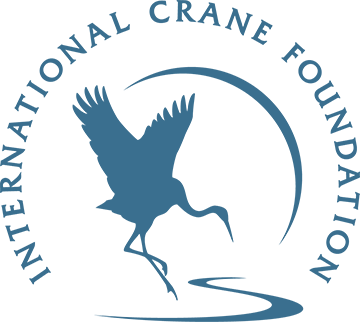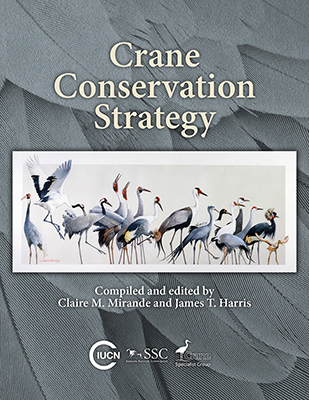Media contact: Claire Mirande, International Crane Foundation Director of Conservation Networking, 608-356-9462, 122
Last updated in 1996…
Worldwide Crane Conservation Strategy updated, available in new book
Baraboo, WI – The latest edition of the IUCN SSC Crane Conservation Strategy is now available. Cranes are one of the most endangered bird families on the planet, with 11 of 15 species facing extinction.
This landmark volume provides a wealth of information to guide the conservation of the world’s fifteen species of cranes and the ecosystems where they occur. It reflects the work and knowledge of dozens of devoted colleagues in the IUCN Species Survival Commission’s Crane Specialist Group.
“The book updates and builds upon the group’s first report, The Cranes: Status Survey and Conservation Action Plan (1996). As such, it charts a comprehensive course forward for crane conservation, synthesizing information on the challenges and opportunities that face the world’s cranes and all who care about them,” explained Kerryn Morrison, International Crane Foundation Vice President – Africa, Senior Manager- Africa for the Endangered Wildlife Trust and Chair of the IUCN SSC Crane Specialist Group, one of many who collaborated on the book. “The book is intended to serve crane researchers, conservationist practitioners, decision makers, and environmental educators around the world.”
Crane Specialist Group members and other conservationists from around the world, contributed to sections, provided published and unpublished information and conducted reviews. Altogether, 31 section authors from the Crane Specialist Group and 191 others reviewed or contributed to the development of this strategic plan.
Cranes are one of many species of concern around the globe that are closely reliant on wetlands. Of the 15 species, 11 are listed as threatened under the IUCN 2019 Red List:
• One Critically Endangered, Siberian Crane
• Three Endangered, Grey Crowned, Red-crowned and Whooping Cranes
• Seven Vulnerable, Black Crowned, Black-necked, Blue, Hooded, Sarus, Wattled and White-naped Cranes
• Four are listed as Least Concern, Brolga, Demoiselle, Eurasian and Sandhill Cranes
“These crane species encompass diverse regions and landscapes, from the taiga to tropical broadleaf forest biomes,” said Claire Mirande, International Crane Foundation Director of Conservation Networking and Program Officer of the IUCN SSC Crane Specialist Group, a compiler and co-editor of the strategy. “Cranes also are readily observable and charismatic because of their beauty, large size, unique calls and behaviors.”
Cranes have a long heritage of cultural and spiritual values in many societies. These attributes – wide distribution, wetland affiliation, conservation status and societal values at local to global scales – make cranes ideal models and ambassadors for conservation of healthy wetlands and grasslands across diverse landscapes. The relationship between cranes and people is remarkably complex, with cranes and people dependent on the same landscapes across the world.
Cranes as a group also can serve a role as umbrella species at a broader ecosystem perspective. Societies around the globe have become increasingly aware of the value of biodiversity and healthy ecosystems, particularly related to wetlands. Conservationists forever strive to minimize the negative impacts to wildlife from the extraordinary transformations that humans have brought to landscapes around the world. Societies are facing growing challenges due to expanding human populations and the resultant increasing pressures on our environment. The strategy outlines ways in which people and cranes can co-exist in these same landscapes, both benefitting from an integrated approach to conservation.
The charisma and cultural significance of cranes have inspired much attention in many countries to finding conservation solutions. Just as crane conservationists have learned from those working with other groups of animals, book collaborators hope these efforts will benefit the conservation of wetland and grassland species, as well as the human communities sharing the landscape.
To reduce the carbon footprint and promote broad circulation, click here to download an electronic version of the book free of charge.

